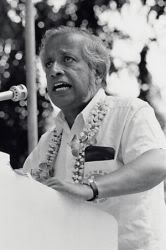Latest update: JBJ’s funeral cortege leaves Funeral Parlour 1, Mount Vernon, at 1 pm on 4 Oct; for 2pm service at St Andrews Cathedral; Cremation at 4.30pm, Mandai Crematorium, Hall 3. Join the Facebook tribute, click here. It has more than 1,100 members so far.
TOC Obituary
Joshua Benjamin Jeyaretnam (5 January 1926 – 30 September 2008)
Choo Zheng Xi / Editor-in-Chief
 To read Joshua Benjamin Jeyaretnam’s history of speeches in Parliament is to marvel at the breadth of the task he took upon himself in 1981, when he entered Parliament as Singapore’s only opposition member. While championing the causes of free speech, the rule of law, and social justice, he unfailingly related them to the concerns of ordinary people.
To read Joshua Benjamin Jeyaretnam’s history of speeches in Parliament is to marvel at the breadth of the task he took upon himself in 1981, when he entered Parliament as Singapore’s only opposition member. While championing the causes of free speech, the rule of law, and social justice, he unfailingly related them to the concerns of ordinary people.
His overarching philosophy was simple. In the Introduction to his book, Make it Right for Singapore, he affirmed the set of core principles he stood by:
‘That they (the people) should determine collectively the good of society and not have it determined for them by anyone above them, however benevolent…It follows that in every democratic society, the individual matters, however lowly he might be.’
This was not empty rhetoric. JBJ would unfailingly enter the arena of Parliament armed with the concerns of ordinary citizens. In one Parliamentary sitting typical of many of his speeches, he brought with him hospital bills of a ‘senior citizen, 68 years of age, unemployed, no income at all’ who could barely afford the consultation charge at a public hospital.
Upon his return to Parliament in 1997 as a Non-Constituency Member of Parliament (NCMP), he moved a motion for an All-Party Committee of Parliament to check on prices for basic necessities, service and conservancy fees, University fees and Class C wards.
In a signature issue that endeared him to taxi-drivers around the island, JBJ constantly inveighed against the diesel tax for taxis, and freeing up taxi ownership licenses from being oligopolized by a handful of companies.
To his mind, no issue was too small to be raised in Parliament, no Singaporean was to be left behind.
The personal toll
The arc of JBJ’s political career is a trajectory of remarkable resilience in the face of hardship.
In his writings, JBJ recalls his fervent support for the UK Labour Party during his university days in London. He held up Aneurin Bevan as his political idol, the coal miner turned Labour Minister responsible for the post-War introduction of the National Health Service (NHS).
While JBJ’s early life never resembled the economic hardship of Bevan’s coal mining days, the turmoil of his political career more than made up for it. Minister Mentor Lee Kuan Yew once boasted that Jeyaretnam knew ‘that in my bag I have a hatchet, and a very sharp one. You take me on, I take my hatchet, we meet in the cul-de-sac’.
Time and again, that hatchet was used on JBJ. In 1986, he lost his parliamentary seat and was disbarred from legal practice after being fined for making a false declaration on the Worker’s Party (WP) accounts in 1982. His disbarment was appealed to the UK Judicial Committee of the Privy Council and was memorably described thus:
The appellant (JBJ) and his co-accused Wong, have suffered a grievous injustice. They have been fined, imprisoned and publicly disgraced for offences of which they are not guilty.
It was to be of no effect. An appeal to the President on the basis of the Privy Council judgment was rejected on the advice of Cabinet.
In 2001, JBJ was to suffer another hatcheting, losing his NCMP seat when he could not pay the damages in a defamation action brought by five People’s Action Party (PAP) MPs.
JBJ bore the blows stoically, selling his books outside Centrepoint in an attempt to discharge himself from bankruptcy. He was bloodied by the hatchet, but stood dignified and unbowed.
But JBJ’s greatest tragedy was personal: the loss of his wife, Margaret Cynthia Walker. They met when he was studying in England, and she had campaigned with him in four failed elections from 1972-1980. She never lived to see his breakthrough victory in Anson, succumbing to breast cancer in 1980. Her death affected him deeply, and might have been the only time in his political career he bordered on regret. In an interview JBJ gave a TOC contributor four months before his passing, he said:
She shared my ideals and then, she left me… for a time I thought why should I carry on? I should just give up,” he said. “But if I wanted to give up, I should have given it up before she died. Then, I don’t know. I might have saved her life.
In his footsteps
To hold JBJ up as a symbol is easy. He stood for those hard done by in a city of plenty of plenty. He stood for an instinctive and simple sense of social justice. He stood for a principled and unyielding position in a political culture that placed a premium on pragmatism.
But the highest honor any Singaporean can pay JBJ is to walk the path he began back in 1981. To live a life of courage, principles, and empathy with our fellow men. To speak truth to power, whoever the ruler may be, at whatever the cost. As JBJ in the interview said:
The strength is in the ordinary people.
———-
